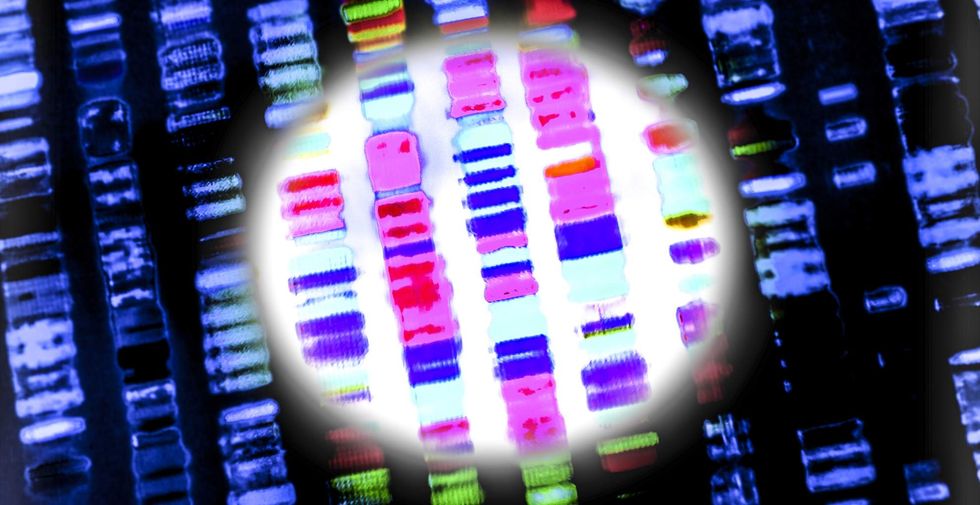
Graphic representation of the DNA sequence (Getty Images)

A panel of researchers at the National Academy of Sciences and National Academy of Medicine are advocating for "germ-line modification" of human babies "in certain narrow circumstances to prevent the birth of children with serious diseases."
Genetically modified children — or "designer babies," as they're often called — are modified by what the MIT Technology Review describes as "a powerful and precise technology for editing DNA" called CRISPR.
While the "gene-editing" technology is already in use in clinical research, critics have long argued that it should not be used for modifying the germ-line — or inherited DNA — of human beings because it could lead to "designer babies" with pre-selected eye color, physical strength or even intelligence.
Dr. Marcy Darnovsky, a liberal policy advocate at the Center for Genetics and Society, argued in 2000, when germ-line modification was just beginning to make waves, that such technology would "significantly exacerbate socio-economic inequality" because "designer babies" would likely only be available to the financially well-off, further widening the gap between the upper and lower classes.
"This is also an era of dizzyingly rapid technoscientific change, and it would be foolish to dismiss the possibility that scientists will achieve enough mastery over the human genome to wreak enormous damage — biologically, culturally, and politically," she wrote.
And conservative author Dinesh D'Souza suggested in 2001 that germ-line modification is an immoral practice because it has the power to pre-determine the makeup of someone's life, taking from them the right to choose freely how to live their lives.
"If parents are able to remake a child’s genetic makeup, they are in a sense writing the genetic instructions that shape his entire life," he wrote. "If my parents give me blue eyes instead of brown eyes, if they make me tall instead of medium height, if they choose a passive over an aggressive personality, their choices will have a direct, lifelong effect on me."
But now the NAS and NAM have said germ-line modification should no longer be seen as a red line in medical research, according to the Review. By applying this technology to human embryos, sperm or eggs, scientists can virtually cut and paste the genetic makeup of human life.
As it stands, any germ-line modification of a human being is already prohibited by law. In 2015, Congress added a rider to a spending bill denying the Food and Drug Administration any federal funds for "research in which a human embryo is intentionally created or modified to include heritable genetic modification."
That provision was renewed in fiscal year 2016. At this point, it is unclear if that rider will be renewed again, though the provision is favored by Republicans, who right now enjoy a majority in both chambers of Congress.
Some scientists, though, believe the ban blocks the potential for life-saving genetic modification.
From the Review:
The legislation ... means that any proposal to modify an embryo and create a child would be ignored and could not legally proceed in the U.S.In contrast, the academy panel argued that germ-line editing should be allowed in narrow cases where it is the only option for “preventing a serious disease or condition.” For instance, a couple who each suffers from beta thalassemia might only have healthy children free from the inherited blood disorder if they were able to produce embryos in which the genetic defect was corrected using gene editing. The report acknowledges that such circumstances might be exceedingly rare.
"Heritable germline genome editing trials must be approached with caution, but caution does not mean that they must be prohibited," the two scientific bodies determined in a report, via the Review, citing concerns that the technology could be used for "enhancements" rather than fighting life-threatening diseases.
The panel, which consists of 22 scientists, said genetic modification should take place only under "stringent oversight" due to the temptation to use the advancement to alter genes to change people's appearance or make them more intelligent, among other things.
Researchers on the panel, wary about the proper use of the technology, admitted it will be many years before germ-line modification can be considered a safe practice, though they favor moving in that direction:
The report’s authors struggled with how legitimate medical applications could be encouraged while still preventing “a slippery slope toward less compelling or even antisocial uses” like enhancement of height, looks, or intelligence. The report’s authors addressed that problem by arguing that no form of germ-line editing should be allowed if a country’s regulators can’t also guarantee the technology won’t be misused for “enhancement” of human beings.
"[The panel has] said there is one narrow corner, a tiny fraction of cases, where [germ-line modification] might be the right thing to do," Eric Lander, head of the Broad Institute, which has invested money into developing CRISPR technology, told the Review. "What is fascinating is their argument that if we can’t control where it goes from there, we shouldn’t do it at all."
And the Review was quick to admit that the line between avoiding dangerous diseases and creating so-called "designer babies" is, in fact, not all that clear.
"In the case of editing human embryos, the line between avoiding serious disease and enhancement may eventually prove to be a blurry one," the Review wrote.